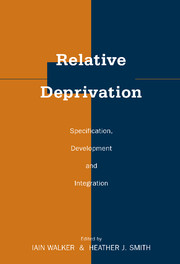Book contents
- Frontmatter
- Contents
- List of Contributors
- 1 Fifty Years of Relative Deprivation Research
- PART ONE SPECIFICATION
- PART TWO DEVELOPMENT
- 6 Personal and Group Relative Deprivation: Connecting the ‘I’ to the ‘We’
- 7 “Poisoning the Consciences of the Fortunate”: The Experience of Relative Advantage and Support for Social Equality
- 8 The Embeddedness of Social Comparison
- 9 Japanese and American Reactions to Gender Discrimination
- 10 Collective Action in Response to Disadvantage: Intergroup Perceptions, Social Identification, and Social Change
- PART THREE INTEGRATION
- Part Four Conclusion
- Index
6 - Personal and Group Relative Deprivation: Connecting the ‘I’ to the ‘We’
Published online by Cambridge University Press: 29 September 2009
- Frontmatter
- Contents
- List of Contributors
- 1 Fifty Years of Relative Deprivation Research
- PART ONE SPECIFICATION
- PART TWO DEVELOPMENT
- 6 Personal and Group Relative Deprivation: Connecting the ‘I’ to the ‘We’
- 7 “Poisoning the Consciences of the Fortunate”: The Experience of Relative Advantage and Support for Social Equality
- 8 The Embeddedness of Social Comparison
- 9 Japanese and American Reactions to Gender Discrimination
- 10 Collective Action in Response to Disadvantage: Intergroup Perceptions, Social Identification, and Social Change
- PART THREE INTEGRATION
- Part Four Conclusion
- Index
Summary
When it was recognized that some groups (e.g., women and African Americans) were unfairly treated in the workforce, the Canadian and American governments, to name a few, took action via affirmative action programs to remedy the situation. These programs include strategies to eliminate systemic barriers and achieve fair representation of target group members at all levels and in every sector of the labor market. This entails profound social changes as members of designated groups access jobs they were previously denied on the basis of such characteristics as race or sex.
In this chapter, we focus on responses to programs designed to improve the conditions of women in the workforce. It will be shown that the attitudes of both those who might gain from the introduction of social change, the disadvantaged group (e.g., women), and those who might lose some longstanding privileges, the advantaged group (e.g., men), can be explained by referring to the concept of relative deprivation. By doing so, this chapter deals with questions raised by Pettigrew (1967) about the consequences of social evaluations. Indeed, relative deprivation refers to the affective reactions to disadvantageous personal and group comparisons. The comparisons identified by Walker and Pettigrew (1984), and believed to be important in the development of feelings of relative deprivation, are pivotal in the reactions of all parties concerned by the introduction of social change.
- Type
- Chapter
- Information
- Relative DeprivationSpecification, Development, and Integration, pp. 119 - 135Publisher: Cambridge University PressPrint publication year: 2001
- 8
- Cited by



